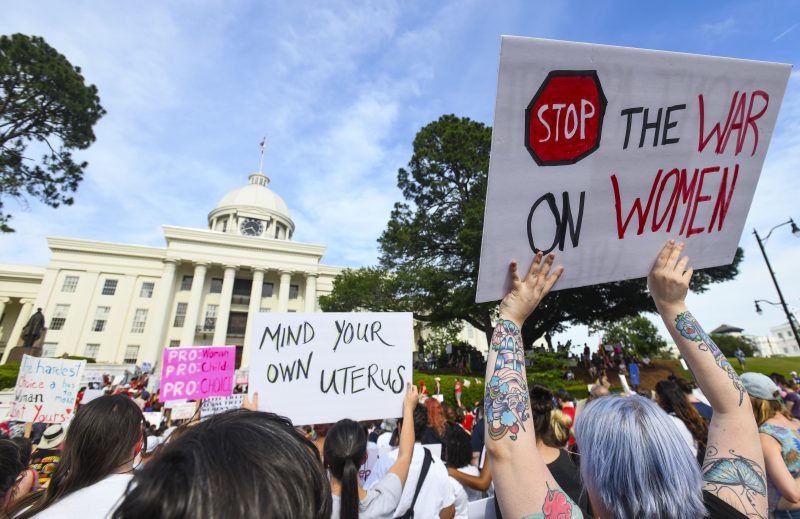In conservative Alabama, an increased blurring of church-state line
Protestors participate in a rally against one of the nation’s most restrictive abortion bans in Alabama, where the traditional separation between church and state has been increasingly blurred (Julie Bennett)
Montgomery (United States) (AFP) – In Alabama, look up — almost anywhere — and you’ll see a church.
In this state already ranked as one of the most religious in the country, the traditional separation between church and state has been increasingly blurred.
Soon, classrooms in Alabama’s public schools may be allowed to hang crucifixes and other religious iconography on their walls; and the religious conservatives who dominate the state have been a potent force in the heated debate over abortion rights.
As a largely religiously driven push to outlaw abortion nationwide gains steam — with two Supreme Court justices appointed by President Donald Trump seen as likely to approve such a reversal — Alabama this year passed one of the country’s most restrictive laws, banning most abortions even in cases of rape or incest.
It will take effect in November unless blocked by legal challenges.
The religiosity of Alabamians is undeniable. Eighty-two percent of Alabama’s 4.8 million people say they believe in God “with absolute certainty,” according to a 2016 Pew survey. Compare that to the 40 percent in Massachusetts who say so.
Some secular-minded Alabamians say they find the pervasive influence of religion repressive, and Americans elsewhere see events in that state as part of a growing threat to the long untouchable line separating church and state.
“I shouldn’t have to follow the rules of a belief system that I don’t belong to,” said 25-year-old Margaux Hartline.
Growing up in Alabama, she was taught that a young girl had to remain a virgin until marriage. She is now a lesbian activist and a fierce defender of abortion rights in this southern state deep in the country’s “Bible Belt.”
Hartline and Amanda Reyes, a spokeswoman for the nonprofit Yellowhammer Fund, which subsidizes abortions for low-income women, say the state’s deeply conservative values lead to a neglect of women’s needs.
They point to a shortage of health care services and bemoan the schools’ conservative approach to sex education.
The high schools, Reyes said, teach that sex “should only be done in the context of heterosexual marriage.”
Is it acceptable, then, to use condoms or other contraceptive methods?
“Oh no,” she said, with a surprised laugh. “Oh my God. Mercy!”
– Abstinence first –
Sex education is not a required subject in Alabama. But if it is taught, teachers must follow the guidance laid out in a 1975 state law advocating abstinence — a stance backed by many religious conservatives.
Under that law, abstinence is promoted “as the only guaranteed way of preventing sexually transmitted diseases and unexpected pregnancies,” said Michael Sibley, a spokesman for the Alabama Department of Education.
Local school systems do “have the ability to teach about contraception if their local board supports that policy” — but that is said to happen rarely.
The 1975 law also requires educators to teach that homosexuality is illegal and unacceptable. A recent attempt by state legislators to remove that language fell short.
Alabama legislators also approved a law permitting the teaching of the Bible and religious history in public schools, as well as allowing the display of religious iconography in classrooms.
Critics say Alabama is opening itself up to legal challenge.
“In a state ranked 49 out of 50 for childhood education, Alabama’s resources would be far better spent improving secular education” than opening itself to “expensive legal liability,” the nonprofit Freedom From Religion Foundation said in a statement.
– ‘A gift from God’ –
That measure awaits approval by Governor Kay Ivey. When she signed the anti-abortion bill into law, she said it underscored Alabamians’ “deeply held belief that every life is precious and that every life is a sacred gift from God.”
Trump, whose base depends heavily on religious conservatives, has welcomed states’ moves to reintroduce religion to schools, as well as efforts to raise religion’s public profile.
“Numerous states introducing Bible Literacy classes, giving students the option of studying the Bible,” he tweeted in January. “Starting to make a turn back? Great!”
But what of the constitutionally-enshrined principle of separation of church and state?
The two are “getting closer and closer and closer,” and the Trump administration thinks “this is their chance,” said Andre Ryland, a local official with the American Humanist Association, which advocates for the separation of church and state.
“There are religious groups of people that are really attempting to get more religion into America’s public system,” with evangelical Protestants leading the fight, he said.
“It’s not easy,” Ryland sighed.
Disclaimer: Validity of the above story is for 7 Days from original date of publishing. Source: AFP.


